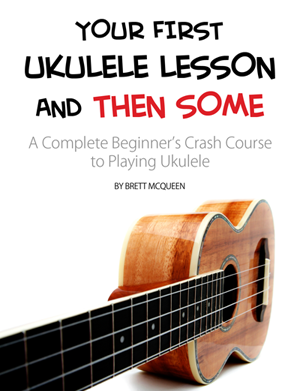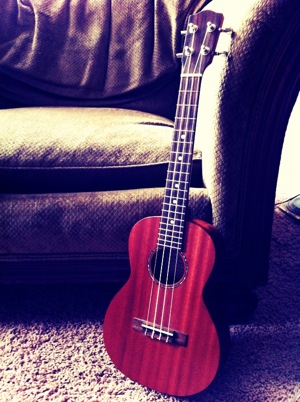 I’ve been receiving a lot of questions through email and comments here on the site asking what type of ukulele I have and how it is tuned. My ukulele has quite a bit of meaning to me, so I thought it’d be cool to make an entire post all about my ukulele, the story behind it, how I tune it, and all that.
I’ve been receiving a lot of questions through email and comments here on the site asking what type of ukulele I have and how it is tuned. My ukulele has quite a bit of meaning to me, so I thought it’d be cool to make an entire post all about my ukulele, the story behind it, how I tune it, and all that.
Where I Got My Ukulele From
In 2009, I was a music intern at a church in Detroit, MI, called Kensington. Kensington is quite different than what you’d probably expect from a church. They do a lot of different types of songs including a lot songs you’d probably even hear on the radio. All to say, for a Christmas service, we were doing an original tune an artist in our community had written and we needed a ukulele.
One of our friends that goes to Kensington, M. J. Franks, is a luthier out of Detroit, MI. No doubt that this guy is making some of the best sounding guitars out there today. The level of detail and craftsmanship Mike puts into his guitars is unbelievable. Needless to say, we needed a ukulele, and Mike had been starting to make ukuleles, so he put together one for us in a couple days.
When my internship came to a close, everyone I worked closely with on staff autographed the back and gave it to me as a going away gift. These folks have become some of my really good friends to this date. In this way, my ukulele is a great reminder for me of the community of friends I have to this day in Michigan.
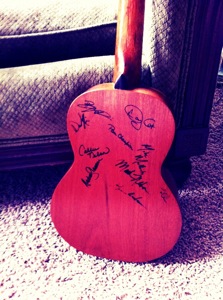
What Size of Ukulele I Have
My ukulele is considered a tenor ukulele. The most common type of ukulele is probably the soprano or the concert ukulele. These ukulele sizes are smaller than a tenor and are known for a brighter and more jangly sound that people often associate with ukuleles.
Tenor ukuleles have a warmer and sometimes deeper sound because of the bigger body style. The frets are sometimes spaced farther apart and there are usually more frets on the fretboard compared to a soprano or concert ukulele. This is nice if you want to play higher up on the neck to reach higher notes. People with larger fingers or hands might find tenor ukes slightly easier to play. Read more about ukulele sizes.
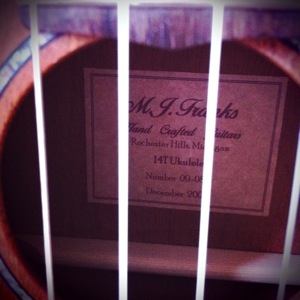
How I Tune My Ukulele
A lot of people who’ve watched my ukulele videos have asked me why my ukulele sounds different than theirs. This is because I am in a low G tuning.
Standard ukulele tuning is gCEA where the lowercase “g” represents the top string tuned to the G above middle C. For my ukulele, rather than tuning to the G above middle C, I tune to the G below middle C. GCEA tuning is known as linear tuning.
I like this tuning because it gives my ukulele a broader range. I can play lower notes and get some of the warmth that comes from the bass of these lower notes. I’m also a ukulele player that has come over from playing guitar where the strings are tuned lowest to highest (linear tuning). For fingerpicking stuff, like my rendition of Leonard Cohen’s “Hallelujah,” it makes more sense in my head with a low G tuning.
Typically, most people will have a low G tuning on a tenor or concert ukulele. Soprano ukuleles aren’t really made for it and baritone ukes are tuned completely different (DGBE).
For my low G tuning, I do have a steel wound low G string. Most normal ukulele strings are nylon. This wound string gives me a bit more tension on the string. Sometimes when you try to tune to low G your G string will become too loose to hold a good tune. I’ve found that a wound string helps with this.
You can get string sets that include a wound low G string. I know the popular ukulele string maker Aquila makes some which are pretty good.
Overall, I loooove my tenor ukulele and I really like using a low G tuning. However, I will say this. I really want to get a concert or soprano uke here in the near future. With my low G tenor uke, I miss the bright sound that you can only get with a soprano or concert uke.
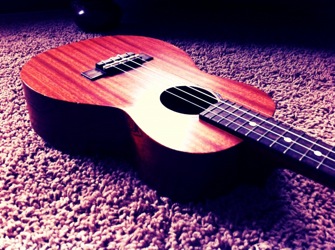
So, there you have it. If you have any questions or if I miss anything, let me know below.
I’m excited to hear what type of ukuleles you all are playing these days. It seems like every ukulele has some type of story behind it that I’ve known of. What kind of ukulele do you have? Why do you (or don’t you) like it? Go ahead. Post your comment below!

